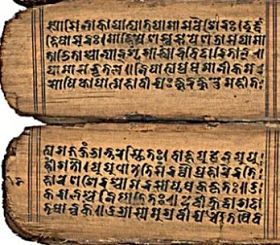18. A Tangled Web: the Age of the Sutra
Rival philosophical schools proliferate and subdivide in our second major historical period, the “age of the sūtra.”
Themes:
• E. Deutsch, “Knowledge and the Tradition Text in Indian Philosophy,” in G.J. Larson and E. Deutsch (eds), Interpreting Across Boundaries: New Essays in Comparative Philosophy (Princeton: 1988), 165-73.
• J. Ganeri and M. Miri, “Sanskrit Philosophical Commentary,” Journal of the Indian Council of Philosophical Research 27 (2010), 187-207.
• D. Krishna, Indian Philosophy: A Counter Perspective (Oxford: 1992).
• B.K. Matilal, “On the Concept of Philosophy in India,” in his Mind, Language and World (Oxford: 2002), ch. 24.
• J.N. Mohanty, Reason and Tradition in Indian Thought (Oxford: 1998).
• A.J. Nicholson, Unifying Hinduism: Philosophy and Identity in Indian Intellectual History (New York: 2010).
• F.M. Müller, Six Systems of Indian Philosophy (London: 1899).






Comments
Dear Peter,
Dear Peter,
thanks again for your ability to make philosophy interesting and entertaining at the same time.
As it is often the case, many historical data in Indian philosophy are open to debate. Nonetheless:
1. The Yogasūtra has always been attributed to Patañjali. It is its commentary, the Bhāṣya, which has been at a certain point attributed to the semi-mythical Vyāsa. Authors like Philipp Maas think that Patañjali was the compiler of the sūtras together with a Bhāṣya thereon.
2. Vedānta means 'the end (anta) of the Veda' not 'what comes after the Veda'. The Upaniṣads are in fact according to Vedāntins the last (culminating) part of the Veda, they are not outside of it.
(3. Bādarāyaṇa and Jaimini might have been contemporaries, but the Brahmasūtra was most probably compiled (the use of this vague term is intentional, since it might refer also only to its final version) after the Mīmāṃsāsūtra, which it imitates.)
In reply to Dear Peter, by elisa freschi
Historical corrections
Hi Elisa,
Great, thanks very much! I actually had already noted the latter two points - I am reading up on the Brahma-Sutra now to write a future episode about it. It even criticizes Jaimini, which is quite interesting. And I had already changed the translation of Vedanta in this script, unfortunately after recording it!
In reply to Historical corrections by Peter Adamson
Thanks, Peter. Yes, Jaimini
Thanks, Peter. Yes, Jaimini is mentioned in the Brahmasūtra and Bādarāyaṇa is mentioned in the Mīmāṃsāsūtra. In fact, both are also mentioned within the respective sūtras, which makes things more complicated…
In reply to Thanks, Peter. Yes, Jaimini by elisa freschi
Jaimini and Badarayana
What I find kind of strange is that whereas modern scholars seem to have no problem in saying "ok, Jaimini is mentioned in the third person in the Mimamsa-Sutra, so he isn't the final compiler," in the Indian tradition itself the commentators don't seem to have let this bother them, and confidently say he is the author. Maybe it is just that they aren't thinking of it as a work with layers by many authors, and they see Jaimini (and Badarayana in the Brahma-Sutra) having the last word/playing the role of the siddhantin, and hence conclude that he is "the author"?
Transcripts
Hello Peter. Are you planning to make transcripts (of episodes) available on this website? That would be very nice (although very generous) help.
In reply to Transcripts by Panna Siyag
Transcripts
Have a look at question 2 under FAQ here on the site (link at bottom of page).
uncompressed
Always a treat to listen to the podcasts! being from computer science I couldn't help noticing a minor glitch: a compressed data file is decompressed to become an uncompressed data file. An uncompressed and a decompressed data file are the same, decompressed refers to the process a compressed file is submitted to achieve the uncompressed (normal) state.
In reply to uncompressed by Jose Castro
compressed
Oh, thanks for catching that! This was just a typo in the script, it should have said "compressed." I will fix it for the book version.
Add new comment